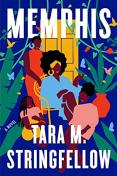BKMT READING GUIDES
Memphis: A Novel
by M. Tara Stringfellow
Hardcover : 272 pages
10 clubs reading this now
1 member has read this book
“A rhapsodic hymn to Black ...
Introduction
NATIONAL BESTSELLER • READ WITH JENNA BOOK CLUB PICK AS FEATURED ON TODAY • A spellbinding debut novel tracing three generations of a Southern Black family and one daughter’s discovery that she has the power to change her family’s legacy.
“A rhapsodic hymn to Black women.”—The New York Times Book Review
“I fell in love with this family, from Joan’s fierce heart to her grandmother Hazel’s determined resilience. Tara Stringfellow will be an author to watch for years to come.”—Jacqueline Woodson, New York Times bestselling author of Red at the Bone
Summer 1995: Ten-year-old Joan, her mother, and her younger sister flee her father’s explosive temper and seek refuge at her mother’s ancestral home in Memphis. This is not the first time violence has altered the course of the family’s trajectory. Half a century earlier, Joan’s grandfather built this majestic house in the historic Black neighborhood of Douglass—only to be lynched days after becoming the first Black detective in the city. Joan tries to settle into her new life, but family secrets cast a longer shadow than any of them expected.As she grows up, Joan finds relief in her artwork, painting portraits of the community in Memphis. One of her subjects is their enigmatic neighbor Miss Dawn, who claims to know something about curses, and whose stories about the past help Joan see how her passion, imagination, and relentless hope are, in fact, the continuation of a long matrilineal tradition. Joan begins to understand that her mother, her mother’s mother, and the mothers before them persevered, made impossible choices, and put their dreams on hold so that her life would not have to be defined by loss and anger—that the sole instrument she needs for healing is her paintbrush.
Unfolding over seventy years through a chorus of unforgettable voices that move back and forth in time, Memphis paints an indelible portrait of inheritance, celebrating the full complexity of what we pass down, in a family and as a country: brutality and justice, faith and forgiveness, sacrifice and love.
Editorial Review
No Editorial Review Currently AvailableDiscussion Questions
From Read with Jenna:1. Joan’s sections are told in first person, while the other North women are written in third person. How did this change in perspective affect your reading experience? Did it make you identify more strongly with any of the characters?
2. Discuss the different generations of North women — and North men — and some of the defining characteristics of each person. Which traits were passed down through the family line? Which traits seem to belong to individuals?
3. Why do you think Miriam brought Joan and Mya to live with August and Derek, despite knowing what happened to Joan years before? Do you think she made the right choice? Why or why not?
4. “Wars fascinated me,” Joan says. “How on earth could a sane man charge into a volley of bullets—say, at D-Day? Weren’t they terrified?” She later compares these feelings to her own experience walking into August’s house knowing Derek lived there, too. What do you make of this comparison? Do you believe personal traumas can be as damaging as war?
5. How do Myron and Hazel’s lives — and deaths — reverberate through the future generations of their family?
6. Memphis is full of cultural references, from historical events and figures to well-known music and literature. How did these details influence your reading experience? Which reference was your favorite?
7. “History had awakened me to the fact that racism is the only food Americans crave,” Stringfellow writes. Discuss this quote. What do you think she means by this? Do you agree? Why or why not?
8. How do the people of Douglass support each other throughout the years? What do you think Memphis is saying about the value of community? Does this community support ever fall short? If so, where?
9. “I wasn’t sure if my burying that comb was what landed my cousin in prison,” Joan says, “but I thanked God — and Miss Dawn — for the magic of it.” Do you believe the magic worked? Either way, do you feel Joan got justice for what happened to her when Derek went to prison? Why or why not?
10. Joan’s relationship with her father remains complicated throughout the novel. “I did not forgive him for abandoning us,” she says. “That is too big a thing to forgive. But driving in the Shelby through the streets of North Memphis with Daddy, I couldn’t deny how lovely it felt to have one.” Do you think it’s possible for a relationship to move forward without forgiveness? Why or why not?
11. One of the themes of the novel is encapsulated in this quotation: “The things women do for the sake of their daughters. The things women don’t.” How do these lines describe the behaviors of the North women?
12. August once says to Joan, “Free? A Black woman hasn’t ever known the meaning of that word, my love.” By the end of the novel, Joan says, contrary to what August told her, that she does feel free. What gives her this freedom? What kind of life do you imagine for Joan and Mya’s own daughters, if they choose to have them?
Book Club Recommendations
Recommended to book clubs by 0 of 0 members.
Book Club HQ to over 88,000+ book clubs and ready to welcome yours.
Get free weekly updates on top club picks, book giveaways, author events and more








